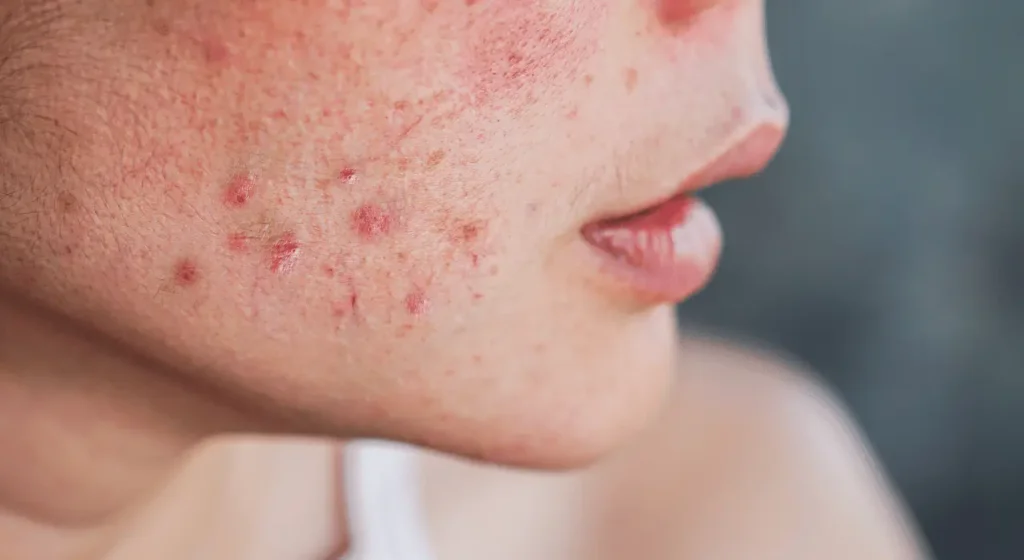Living with acne-prone skin can be a challenge, often impacting skin health. The key to managing this issue lies in understanding your skin and tailoring your skincare routine to its unique needs. In this article, we’ll dive into essential beauty tips to help you navigate the complex world of acne-prone skin care.
“Acne-prone skin is more than a cosmetic issue; it’s a complex interplay between genetics, environment, and lifestyle. Understanding this helps us approach acne care with the empathy and precision it demands,” says Dr Sarah Shah, a leading aesthetician and founder of the celebrated Artistry Clinic in London.
What Are The Key Triggers Of Acne?
Acne is a common skin condition when hair follicles become blocked with oil and dead skin cells. It typically manifests as pimples, blackheads, or whiteheads, primarily on the face, forehead, chest, upper back, and shoulders. While acne is most prevalent among teenagers, it can affect individuals of all ages. Identifying and managing the various triggers of acne is a vital step in controlling and preventing outbreaks.
- Hormonal Changes: Hormonal fluctuations during puberty, menstrual cycles, pregnancy, and menopause can increase sebum production, leading to clogged pores.
- Stress: Stress-induced androgens can stimulate the skin’s oil glands and hair follicles, exacerbating acne. Activities like yoga, meditation, regular exercise, and adequate sleep can help manage stress levels and reduce breakouts.
- Diet: Foods high in refined sugars and dairy products can trigger acne. Conversely, a diet rich in antioxidants and anti-inflammatory properties, found in fruits, vegetables, and whole grains, can support skin health.
- Skincare Products: Using inappropriate skincare products for your skin type can irritate and worsen acne. Opt for non-comedogenic and oil-free products, especially in makeup and sunscreens. Certain medications, such as corticosteroids, androgens, or lithium, can also cause acne as a side effect.
- Environmental Factors: Pollution and humidity can accumulate dirt and sweat on the skin, contributing to clogged pores. Keeping the skin clean and protected in high-pollution environments is important.
10 Beauty Tips to Manage Acne-Prone Skin

Acne-prone skin, therefore, requires special care and attention. Luckily for you, we’ve got ten essential beauty tips to help manage and improve your skin’s health, ensuring a clearer and more radiant complexion:
1. Know Your Skin Type
Understanding your skin type is vital in crafting an effective acne care regimen. Oily skin, characterised by enlarged pores and a shiny complexion, benefits from products that regulate oil production. Dry skin, which may feel tight and have visible flaking, requires hydrating products that don’t strip moisture. Combination skin, presenting both oily and dry areas, needs a balanced approach with products targeting specific zones. Sensitive skin, prone to redness and irritation, necessitates gentle, soothing ingredients. Tailoring your skincare to your skin type can significantly enhance its effectiveness against acne.
2. Gentle Cleansing: The Foundation of Acne Care
Cleansing, while fundamental, should be approached with caution for acne-prone skin. Harsh cleansers can exacerbate acne by stripping essential oils and triggering increased oil production. Instead, choose gentle, non-comedogenic cleansers that remove impurities without irritating. The frequency of cleansing is equally important. While twice daily, morning and night, is standard, pay attention to how your skin responds and adjust if needed, especially if your skin is dry or sensitive.
3. Exfoliation: Clearing the Way
Exfoliation is critical in preventing acne, as it helps remove dead skin cells that can clog pores. However, the method and frequency of exfoliation should be carefully considered. Mechanical exfoliants can be abrasive for acne-prone skin, whereas chemical exfoliants like salicylic acid provide a gentler option. It’s advisable to exfoliate once or twice a week, depending on your skin’s tolerance, to avoid over-exfoliating, which can lead to irritation and exacerbate acne.
4. Key Ingredients for Fighting Acne
Choosing the right ingredients is crucial in managing acne. Salicylic acid, a beta-hydroxy acid, exfoliates the skin and unclogs pores. Benzoyl peroxide is effective in killing acne-causing bacteria and helps reduce inflammation. Tea tree oil, known for its natural antibacterial properties, can be a gentler alternative to harsher chemical treatments.
“Ingredients like salicylic acid, benzoyl peroxide, and tea tree oil are not just buzzwords; they are the arsenal in our fight against acne. Each of these has a specific role, targeting different aspects of acne formation,” Dr. Shah says as she explains the importance of choosing the right ingredients for acne-prone skin.
5. Moisturising: A Must for All Skin Types
Moisturising is a critical step in acne care, irrespective of skin type. It’s a common misconception that acne-prone skin doesn’t require additional moisture, especially if oily. On the contrary, all skin types need hydration to maintain a healthy skin barrier. Lightweight, oil-free moisturisers can hydrate the skin without contributing to further breakouts. Regular moisturising helps maintain the balance of natural oils, thereby reducing the likelihood of acne flare-ups.
6. Sun Protection: Essential for Acne-Prone Skin
Sunscreen is crucial for acne-prone skin, not only to prevent sunburn but also to avoid exacerbating acne and post-inflammatory hyperpigmentation, which can occur after acne lesions heal. UV rays can inflame and irritate acne-prone skin, making existing acne worse. Choose sunscreens labelled as non-comedogenic, which means they won’t clog pores, a key consideration for acne-prone skin. Applying a broad-spectrum sunscreen with at least SPF 30 daily, regardless of the weather, is essential as UV rays penetrate clouds and windows.
7. Makeup and Acne: Choose Wisely
Regarding makeup for acne-prone skin, the focus should be on products that do not aggravate existing skin issues. Non-comedogenic makeup is specifically formulated not to block pores, reducing the risk of further breakouts. Equally important is the removal of makeup; leaving makeup on overnight can clog pores and lead to acne. Using gentle, effective makeup removers or cleansing oils ensures your skin can breathe and recover overnight.
8. Diet and Skin Health: What to Eat and Avoid
Diet can influence skin health, especially for those with acne-prone skin. Foods high in antioxidants, such as berries, nuts, and vegetables, help reduce inflammation and protect skin cells. Omega-3 fatty acids, found in fatty fish, nuts, and seeds, can also reduce the incidence of acne by moderating the production of inflammatory compounds. Conversely, diets high in refined sugars and dairy products have been linked to an increase in acne. Maintaining a balanced diet and staying hydrated can positively impact your skin health.
9. Avoiding Common Skincare Mistakes

Common skincare mistakes can aggravate acne-prone skin. Popping pimples can push bacteria and pus deeper into the skin, causing more inflammation and scarring. Over-exfoliating or using harsh products can strip the skin of natural oils, leading to increased oil production and more breakouts. It’s important to use gentle, acne-specific products and resist the urge to pick or pop pimples.
10. Knowing When to See a Dermatologist
Over-the-counter products may not be sufficient for persistent or severe acne. A dermatologist can provide a more targeted approach to acne treatment. They can prescribe medications and treatments like retinoids, antibiotics, or hormonal therapies, often more effective than over-the-counter options.
“Seeking professional help for acne should never be a last resort. Early intervention can prevent scarring and significantly improve quality of life,” advises Dr. Shah
Managing acne-prone skin requires patience and consistency. Each product or routine will only work miracles after a period of time. It’s about finding what works for you and sticking to it. Remember, every skin is unique, and understanding yours is the first step towards healthier, clearer skin. Stay consistent with your skincare routine; over time, you’ll see the changes you’re hoping for.


